The Effects of Social Media on Knowledge Management in MNCs
VerifiedAdded on 2023/06/10
|10
|2772
|495
Report
AI Summary
This report provides a comprehensive analysis of the role of social media in multi-national corporations (MNCs), focusing on its impact on knowledge management. It explores how social media facilitates knowledge sharing, building social capital, and supporting innovation within organizations. The report delves into the benefits of social media in aiding problem-solving and improving communication, both internally and externally. It also addresses the potential risks associated with social media use, such as resource allocation, legal considerations, and language barriers. The report highlights the importance of strategic integration of social media to maximize its benefits, including enhanced brand awareness, improved customer engagement, and increased market competitiveness. The study underscores the importance of understanding and managing social media to promote effective knowledge management and drive business success in the global landscape.
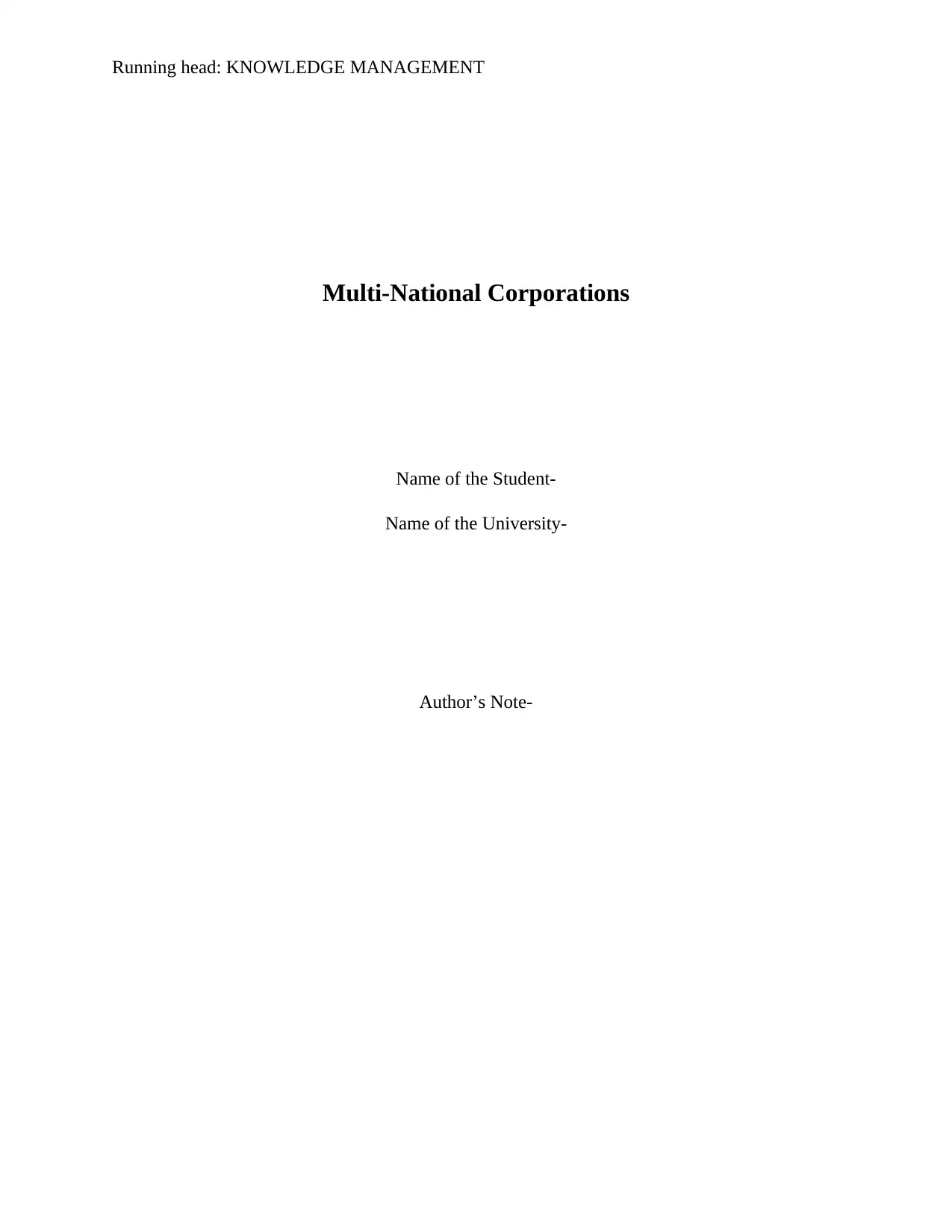
Running head: KNOWLEDGE MANAGEMENT
Multi-National Corporations
Name of the Student-
Name of the University-
Author’s Note-
Multi-National Corporations
Name of the Student-
Name of the University-
Author’s Note-
Paraphrase This Document
Need a fresh take? Get an instant paraphrase of this document with our AI Paraphraser
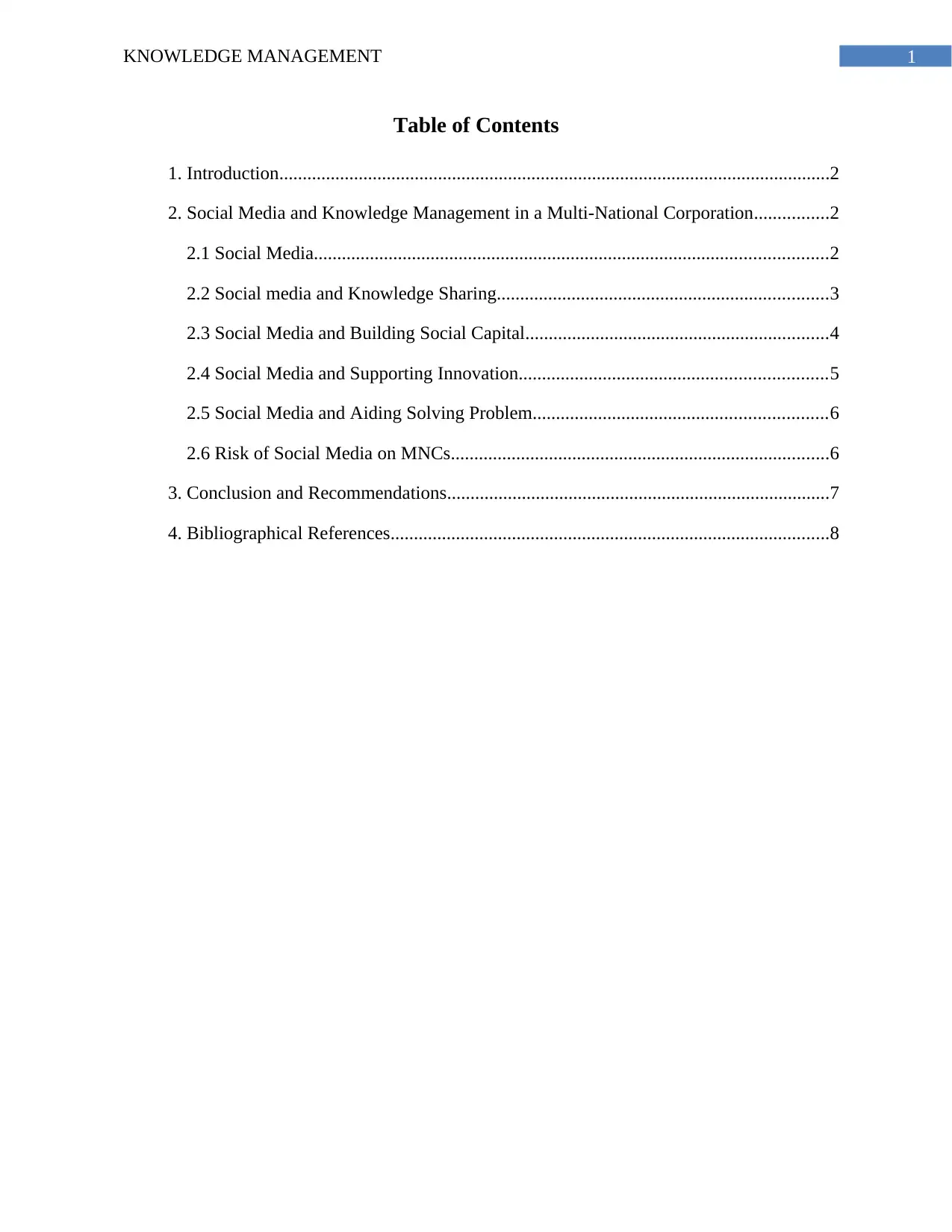
1KNOWLEDGE MANAGEMENT
Table of Contents
1. Introduction......................................................................................................................2
2. Social Media and Knowledge Management in a Multi-National Corporation................2
2.1 Social Media..............................................................................................................2
2.2 Social media and Knowledge Sharing.......................................................................3
2.3 Social Media and Building Social Capital.................................................................4
2.4 Social Media and Supporting Innovation..................................................................5
2.5 Social Media and Aiding Solving Problem...............................................................6
2.6 Risk of Social Media on MNCs.................................................................................6
3. Conclusion and Recommendations..................................................................................7
4. Bibliographical References..............................................................................................8
Table of Contents
1. Introduction......................................................................................................................2
2. Social Media and Knowledge Management in a Multi-National Corporation................2
2.1 Social Media..............................................................................................................2
2.2 Social media and Knowledge Sharing.......................................................................3
2.3 Social Media and Building Social Capital.................................................................4
2.4 Social Media and Supporting Innovation..................................................................5
2.5 Social Media and Aiding Solving Problem...............................................................6
2.6 Risk of Social Media on MNCs.................................................................................6
3. Conclusion and Recommendations..................................................................................7
4. Bibliographical References..............................................................................................8
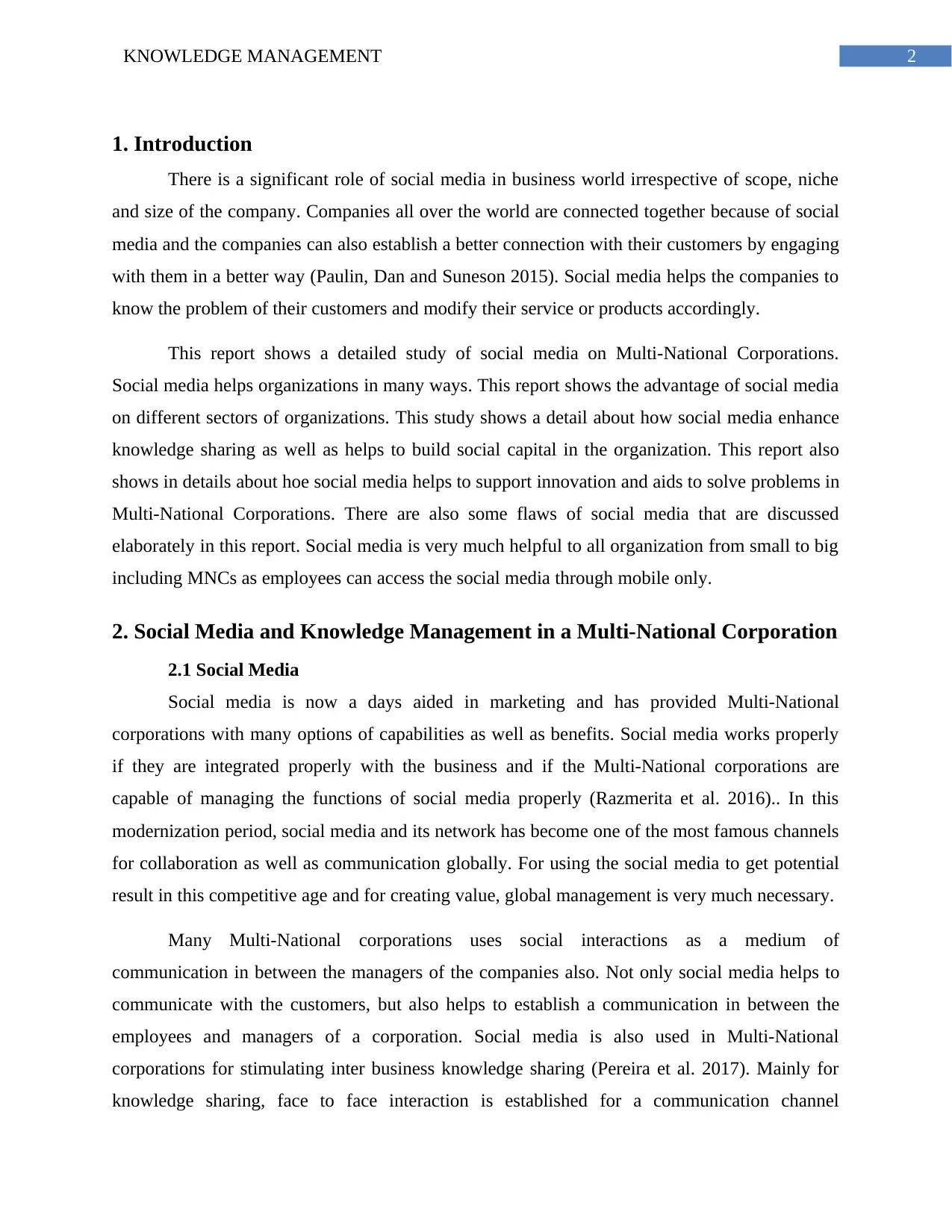
2KNOWLEDGE MANAGEMENT
1. Introduction
There is a significant role of social media in business world irrespective of scope, niche
and size of the company. Companies all over the world are connected together because of social
media and the companies can also establish a better connection with their customers by engaging
with them in a better way (Paulin, Dan and Suneson 2015). Social media helps the companies to
know the problem of their customers and modify their service or products accordingly.
This report shows a detailed study of social media on Multi-National Corporations.
Social media helps organizations in many ways. This report shows the advantage of social media
on different sectors of organizations. This study shows a detail about how social media enhance
knowledge sharing as well as helps to build social capital in the organization. This report also
shows in details about hoe social media helps to support innovation and aids to solve problems in
Multi-National Corporations. There are also some flaws of social media that are discussed
elaborately in this report. Social media is very much helpful to all organization from small to big
including MNCs as employees can access the social media through mobile only.
2. Social Media and Knowledge Management in a Multi-National Corporation
2.1 Social Media
Social media is now a days aided in marketing and has provided Multi-National
corporations with many options of capabilities as well as benefits. Social media works properly
if they are integrated properly with the business and if the Multi-National corporations are
capable of managing the functions of social media properly (Razmerita et al. 2016).. In this
modernization period, social media and its network has become one of the most famous channels
for collaboration as well as communication globally. For using the social media to get potential
result in this competitive age and for creating value, global management is very much necessary.
Many Multi-National corporations uses social interactions as a medium of
communication in between the managers of the companies also. Not only social media helps to
communicate with the customers, but also helps to establish a communication in between the
employees and managers of a corporation. Social media is also used in Multi-National
corporations for stimulating inter business knowledge sharing (Pereira et al. 2017). Mainly for
knowledge sharing, face to face interaction is established for a communication channel
1. Introduction
There is a significant role of social media in business world irrespective of scope, niche
and size of the company. Companies all over the world are connected together because of social
media and the companies can also establish a better connection with their customers by engaging
with them in a better way (Paulin, Dan and Suneson 2015). Social media helps the companies to
know the problem of their customers and modify their service or products accordingly.
This report shows a detailed study of social media on Multi-National Corporations.
Social media helps organizations in many ways. This report shows the advantage of social media
on different sectors of organizations. This study shows a detail about how social media enhance
knowledge sharing as well as helps to build social capital in the organization. This report also
shows in details about hoe social media helps to support innovation and aids to solve problems in
Multi-National Corporations. There are also some flaws of social media that are discussed
elaborately in this report. Social media is very much helpful to all organization from small to big
including MNCs as employees can access the social media through mobile only.
2. Social Media and Knowledge Management in a Multi-National Corporation
2.1 Social Media
Social media is now a days aided in marketing and has provided Multi-National
corporations with many options of capabilities as well as benefits. Social media works properly
if they are integrated properly with the business and if the Multi-National corporations are
capable of managing the functions of social media properly (Razmerita et al. 2016).. In this
modernization period, social media and its network has become one of the most famous channels
for collaboration as well as communication globally. For using the social media to get potential
result in this competitive age and for creating value, global management is very much necessary.
Many Multi-National corporations uses social interactions as a medium of
communication in between the managers of the companies also. Not only social media helps to
communicate with the customers, but also helps to establish a communication in between the
employees and managers of a corporation. Social media is also used in Multi-National
corporations for stimulating inter business knowledge sharing (Pereira et al. 2017). Mainly for
knowledge sharing, face to face interaction is established for a communication channel
⊘ This is a preview!⊘
Do you want full access?
Subscribe today to unlock all pages.

Trusted by 1+ million students worldwide
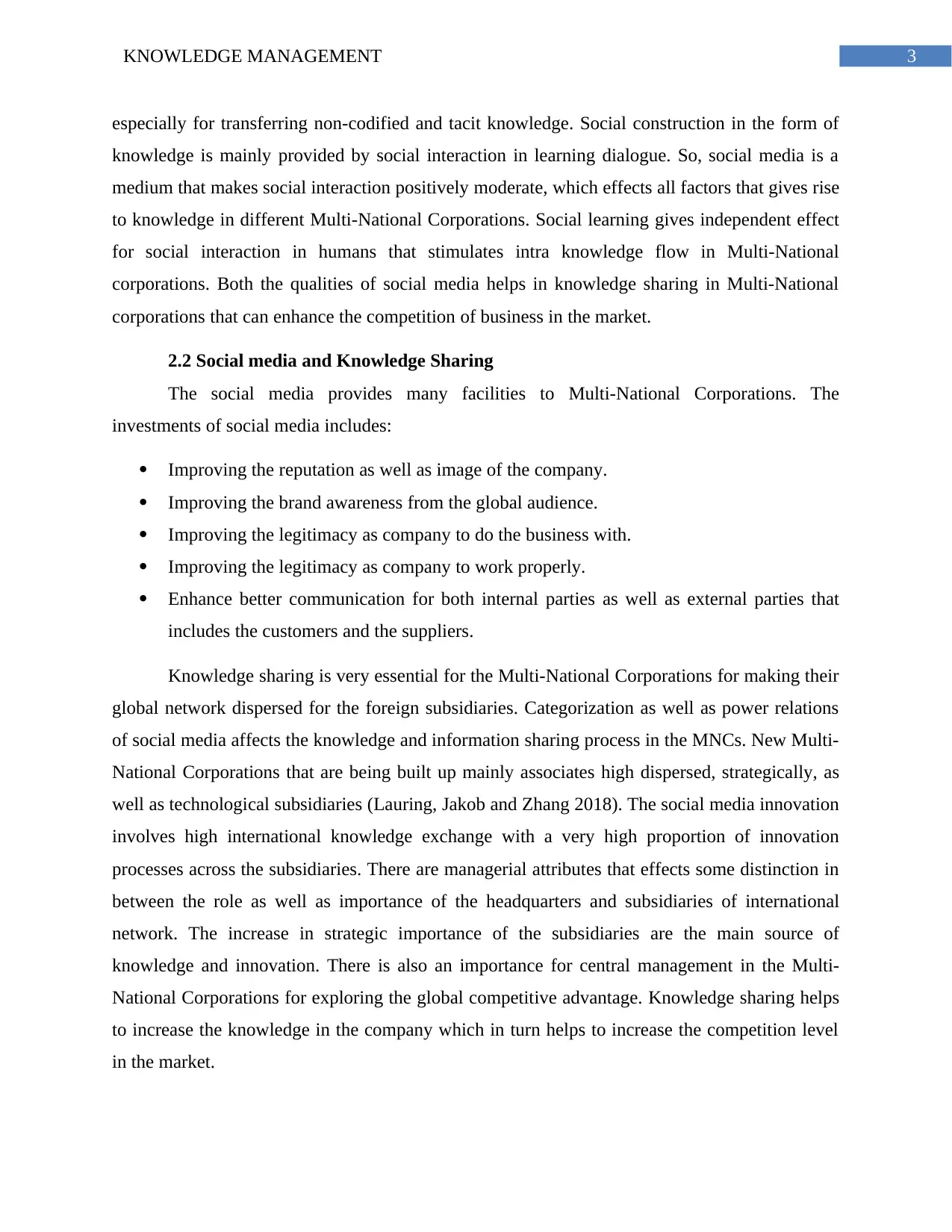
3KNOWLEDGE MANAGEMENT
especially for transferring non-codified and tacit knowledge. Social construction in the form of
knowledge is mainly provided by social interaction in learning dialogue. So, social media is a
medium that makes social interaction positively moderate, which effects all factors that gives rise
to knowledge in different Multi-National Corporations. Social learning gives independent effect
for social interaction in humans that stimulates intra knowledge flow in Multi-National
corporations. Both the qualities of social media helps in knowledge sharing in Multi-National
corporations that can enhance the competition of business in the market.
2.2 Social media and Knowledge Sharing
The social media provides many facilities to Multi-National Corporations. The
investments of social media includes:
Improving the reputation as well as image of the company.
Improving the brand awareness from the global audience.
Improving the legitimacy as company to do the business with.
Improving the legitimacy as company to work properly.
Enhance better communication for both internal parties as well as external parties that
includes the customers and the suppliers.
Knowledge sharing is very essential for the Multi-National Corporations for making their
global network dispersed for the foreign subsidiaries. Categorization as well as power relations
of social media affects the knowledge and information sharing process in the MNCs. New Multi-
National Corporations that are being built up mainly associates high dispersed, strategically, as
well as technological subsidiaries (Lauring, Jakob and Zhang 2018). The social media innovation
involves high international knowledge exchange with a very high proportion of innovation
processes across the subsidiaries. There are managerial attributes that effects some distinction in
between the role as well as importance of the headquarters and subsidiaries of international
network. The increase in strategic importance of the subsidiaries are the main source of
knowledge and innovation. There is also an importance for central management in the Multi-
National Corporations for exploring the global competitive advantage. Knowledge sharing helps
to increase the knowledge in the company which in turn helps to increase the competition level
in the market.
especially for transferring non-codified and tacit knowledge. Social construction in the form of
knowledge is mainly provided by social interaction in learning dialogue. So, social media is a
medium that makes social interaction positively moderate, which effects all factors that gives rise
to knowledge in different Multi-National Corporations. Social learning gives independent effect
for social interaction in humans that stimulates intra knowledge flow in Multi-National
corporations. Both the qualities of social media helps in knowledge sharing in Multi-National
corporations that can enhance the competition of business in the market.
2.2 Social media and Knowledge Sharing
The social media provides many facilities to Multi-National Corporations. The
investments of social media includes:
Improving the reputation as well as image of the company.
Improving the brand awareness from the global audience.
Improving the legitimacy as company to do the business with.
Improving the legitimacy as company to work properly.
Enhance better communication for both internal parties as well as external parties that
includes the customers and the suppliers.
Knowledge sharing is very essential for the Multi-National Corporations for making their
global network dispersed for the foreign subsidiaries. Categorization as well as power relations
of social media affects the knowledge and information sharing process in the MNCs. New Multi-
National Corporations that are being built up mainly associates high dispersed, strategically, as
well as technological subsidiaries (Lauring, Jakob and Zhang 2018). The social media innovation
involves high international knowledge exchange with a very high proportion of innovation
processes across the subsidiaries. There are managerial attributes that effects some distinction in
between the role as well as importance of the headquarters and subsidiaries of international
network. The increase in strategic importance of the subsidiaries are the main source of
knowledge and innovation. There is also an importance for central management in the Multi-
National Corporations for exploring the global competitive advantage. Knowledge sharing helps
to increase the knowledge in the company which in turn helps to increase the competition level
in the market.
Paraphrase This Document
Need a fresh take? Get an instant paraphrase of this document with our AI Paraphraser
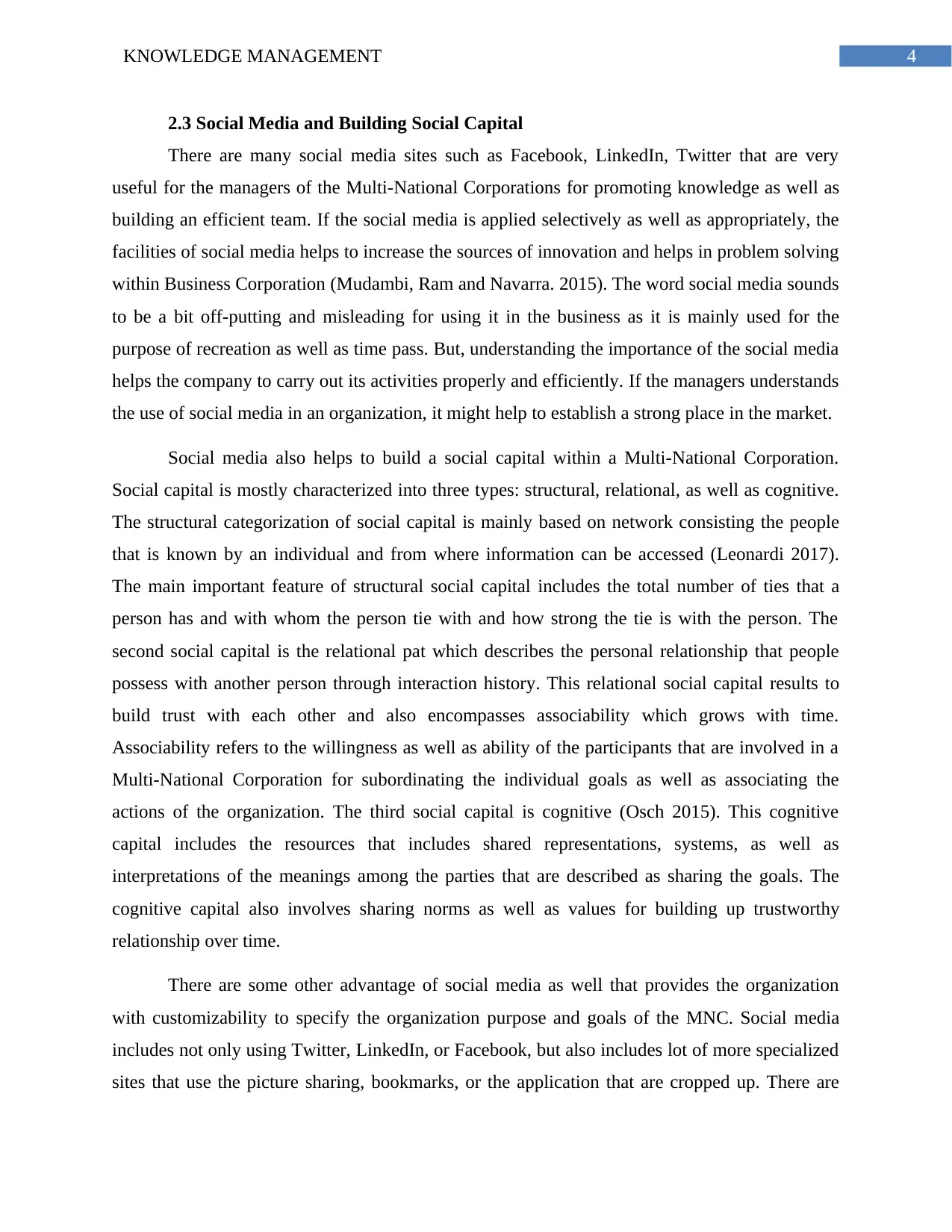
4KNOWLEDGE MANAGEMENT
2.3 Social Media and Building Social Capital
There are many social media sites such as Facebook, LinkedIn, Twitter that are very
useful for the managers of the Multi-National Corporations for promoting knowledge as well as
building an efficient team. If the social media is applied selectively as well as appropriately, the
facilities of social media helps to increase the sources of innovation and helps in problem solving
within Business Corporation (Mudambi, Ram and Navarra. 2015). The word social media sounds
to be a bit off-putting and misleading for using it in the business as it is mainly used for the
purpose of recreation as well as time pass. But, understanding the importance of the social media
helps the company to carry out its activities properly and efficiently. If the managers understands
the use of social media in an organization, it might help to establish a strong place in the market.
Social media also helps to build a social capital within a Multi-National Corporation.
Social capital is mostly characterized into three types: structural, relational, as well as cognitive.
The structural categorization of social capital is mainly based on network consisting the people
that is known by an individual and from where information can be accessed (Leonardi 2017).
The main important feature of structural social capital includes the total number of ties that a
person has and with whom the person tie with and how strong the tie is with the person. The
second social capital is the relational pat which describes the personal relationship that people
possess with another person through interaction history. This relational social capital results to
build trust with each other and also encompasses associability which grows with time.
Associability refers to the willingness as well as ability of the participants that are involved in a
Multi-National Corporation for subordinating the individual goals as well as associating the
actions of the organization. The third social capital is cognitive (Osch 2015). This cognitive
capital includes the resources that includes shared representations, systems, as well as
interpretations of the meanings among the parties that are described as sharing the goals. The
cognitive capital also involves sharing norms as well as values for building up trustworthy
relationship over time.
There are some other advantage of social media as well that provides the organization
with customizability to specify the organization purpose and goals of the MNC. Social media
includes not only using Twitter, LinkedIn, or Facebook, but also includes lot of more specialized
sites that use the picture sharing, bookmarks, or the application that are cropped up. There are
2.3 Social Media and Building Social Capital
There are many social media sites such as Facebook, LinkedIn, Twitter that are very
useful for the managers of the Multi-National Corporations for promoting knowledge as well as
building an efficient team. If the social media is applied selectively as well as appropriately, the
facilities of social media helps to increase the sources of innovation and helps in problem solving
within Business Corporation (Mudambi, Ram and Navarra. 2015). The word social media sounds
to be a bit off-putting and misleading for using it in the business as it is mainly used for the
purpose of recreation as well as time pass. But, understanding the importance of the social media
helps the company to carry out its activities properly and efficiently. If the managers understands
the use of social media in an organization, it might help to establish a strong place in the market.
Social media also helps to build a social capital within a Multi-National Corporation.
Social capital is mostly characterized into three types: structural, relational, as well as cognitive.
The structural categorization of social capital is mainly based on network consisting the people
that is known by an individual and from where information can be accessed (Leonardi 2017).
The main important feature of structural social capital includes the total number of ties that a
person has and with whom the person tie with and how strong the tie is with the person. The
second social capital is the relational pat which describes the personal relationship that people
possess with another person through interaction history. This relational social capital results to
build trust with each other and also encompasses associability which grows with time.
Associability refers to the willingness as well as ability of the participants that are involved in a
Multi-National Corporation for subordinating the individual goals as well as associating the
actions of the organization. The third social capital is cognitive (Osch 2015). This cognitive
capital includes the resources that includes shared representations, systems, as well as
interpretations of the meanings among the parties that are described as sharing the goals. The
cognitive capital also involves sharing norms as well as values for building up trustworthy
relationship over time.
There are some other advantage of social media as well that provides the organization
with customizability to specify the organization purpose and goals of the MNC. Social media
includes not only using Twitter, LinkedIn, or Facebook, but also includes lot of more specialized
sites that use the picture sharing, bookmarks, or the application that are cropped up. There are
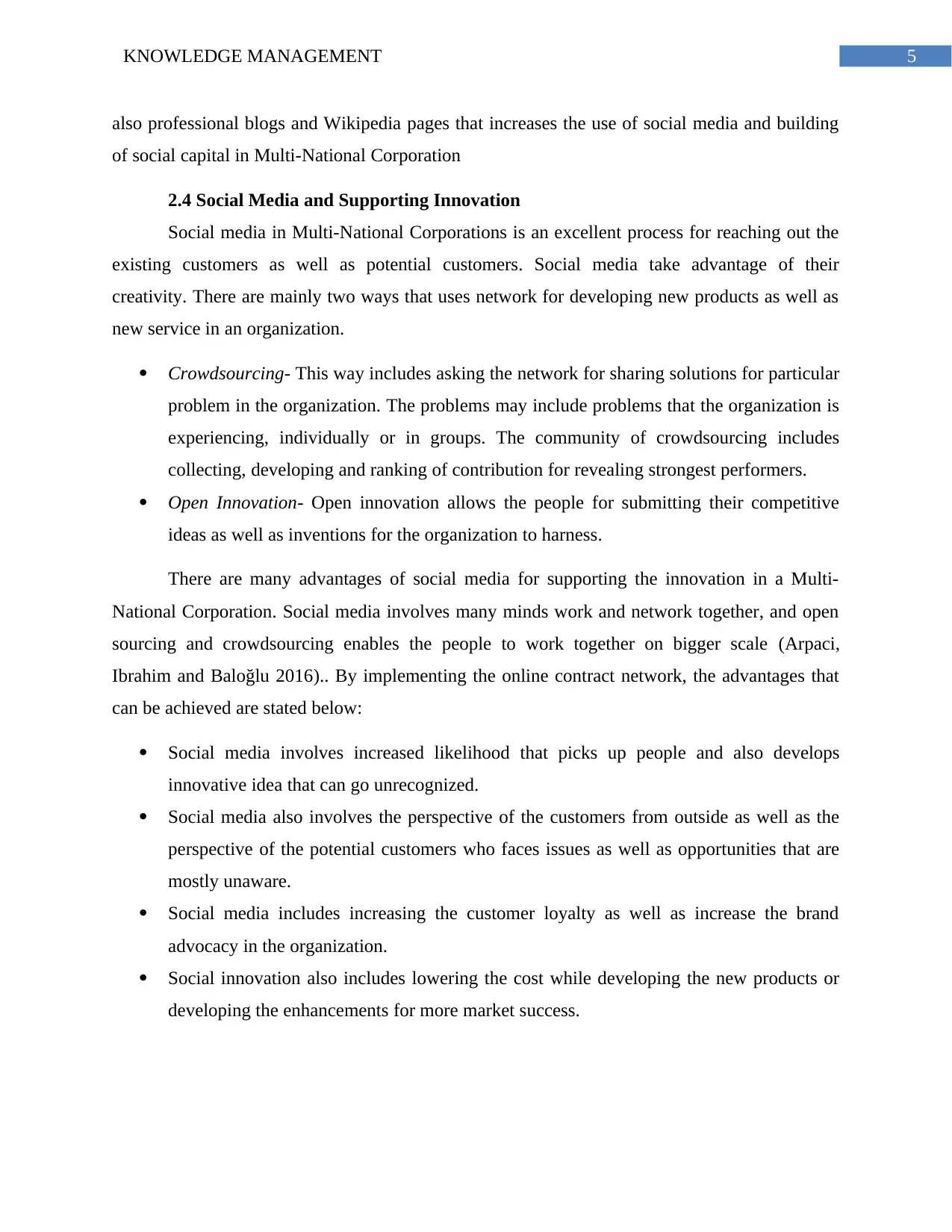
5KNOWLEDGE MANAGEMENT
also professional blogs and Wikipedia pages that increases the use of social media and building
of social capital in Multi-National Corporation
2.4 Social Media and Supporting Innovation
Social media in Multi-National Corporations is an excellent process for reaching out the
existing customers as well as potential customers. Social media take advantage of their
creativity. There are mainly two ways that uses network for developing new products as well as
new service in an organization.
Crowdsourcing- This way includes asking the network for sharing solutions for particular
problem in the organization. The problems may include problems that the organization is
experiencing, individually or in groups. The community of crowdsourcing includes
collecting, developing and ranking of contribution for revealing strongest performers.
Open Innovation- Open innovation allows the people for submitting their competitive
ideas as well as inventions for the organization to harness.
There are many advantages of social media for supporting the innovation in a Multi-
National Corporation. Social media involves many minds work and network together, and open
sourcing and crowdsourcing enables the people to work together on bigger scale (Arpaci,
Ibrahim and Baloğlu 2016).. By implementing the online contract network, the advantages that
can be achieved are stated below:
Social media involves increased likelihood that picks up people and also develops
innovative idea that can go unrecognized.
Social media also involves the perspective of the customers from outside as well as the
perspective of the potential customers who faces issues as well as opportunities that are
mostly unaware.
Social media includes increasing the customer loyalty as well as increase the brand
advocacy in the organization.
Social innovation also includes lowering the cost while developing the new products or
developing the enhancements for more market success.
also professional blogs and Wikipedia pages that increases the use of social media and building
of social capital in Multi-National Corporation
2.4 Social Media and Supporting Innovation
Social media in Multi-National Corporations is an excellent process for reaching out the
existing customers as well as potential customers. Social media take advantage of their
creativity. There are mainly two ways that uses network for developing new products as well as
new service in an organization.
Crowdsourcing- This way includes asking the network for sharing solutions for particular
problem in the organization. The problems may include problems that the organization is
experiencing, individually or in groups. The community of crowdsourcing includes
collecting, developing and ranking of contribution for revealing strongest performers.
Open Innovation- Open innovation allows the people for submitting their competitive
ideas as well as inventions for the organization to harness.
There are many advantages of social media for supporting the innovation in a Multi-
National Corporation. Social media involves many minds work and network together, and open
sourcing and crowdsourcing enables the people to work together on bigger scale (Arpaci,
Ibrahim and Baloğlu 2016).. By implementing the online contract network, the advantages that
can be achieved are stated below:
Social media involves increased likelihood that picks up people and also develops
innovative idea that can go unrecognized.
Social media also involves the perspective of the customers from outside as well as the
perspective of the potential customers who faces issues as well as opportunities that are
mostly unaware.
Social media includes increasing the customer loyalty as well as increase the brand
advocacy in the organization.
Social innovation also includes lowering the cost while developing the new products or
developing the enhancements for more market success.
⊘ This is a preview!⊘
Do you want full access?
Subscribe today to unlock all pages.

Trusted by 1+ million students worldwide
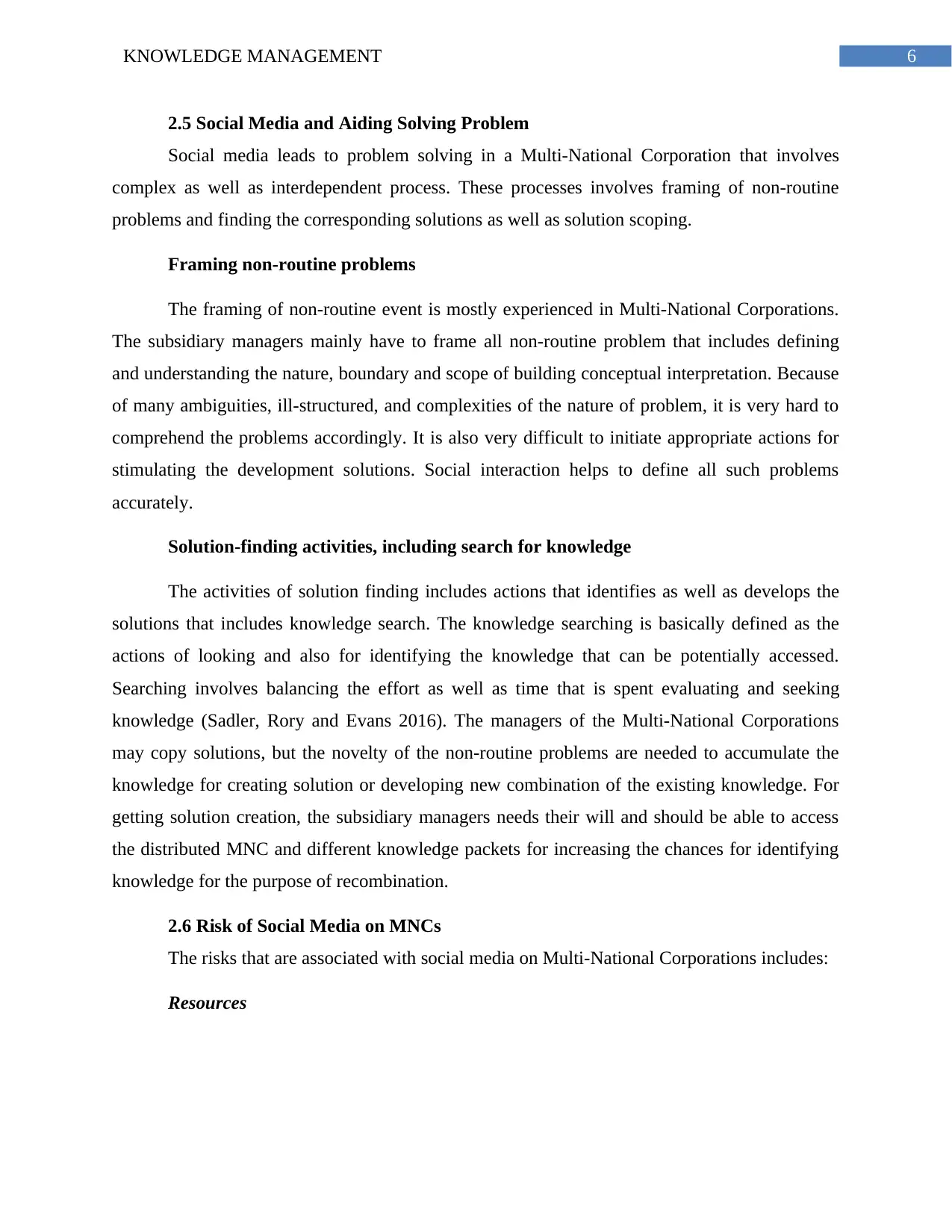
6KNOWLEDGE MANAGEMENT
2.5 Social Media and Aiding Solving Problem
Social media leads to problem solving in a Multi-National Corporation that involves
complex as well as interdependent process. These processes involves framing of non-routine
problems and finding the corresponding solutions as well as solution scoping.
Framing non-routine problems
The framing of non-routine event is mostly experienced in Multi-National Corporations.
The subsidiary managers mainly have to frame all non-routine problem that includes defining
and understanding the nature, boundary and scope of building conceptual interpretation. Because
of many ambiguities, ill-structured, and complexities of the nature of problem, it is very hard to
comprehend the problems accordingly. It is also very difficult to initiate appropriate actions for
stimulating the development solutions. Social interaction helps to define all such problems
accurately.
Solution-finding activities, including search for knowledge
The activities of solution finding includes actions that identifies as well as develops the
solutions that includes knowledge search. The knowledge searching is basically defined as the
actions of looking and also for identifying the knowledge that can be potentially accessed.
Searching involves balancing the effort as well as time that is spent evaluating and seeking
knowledge (Sadler, Rory and Evans 2016). The managers of the Multi-National Corporations
may copy solutions, but the novelty of the non-routine problems are needed to accumulate the
knowledge for creating solution or developing new combination of the existing knowledge. For
getting solution creation, the subsidiary managers needs their will and should be able to access
the distributed MNC and different knowledge packets for increasing the chances for identifying
knowledge for the purpose of recombination.
2.6 Risk of Social Media on MNCs
The risks that are associated with social media on Multi-National Corporations includes:
Resources
2.5 Social Media and Aiding Solving Problem
Social media leads to problem solving in a Multi-National Corporation that involves
complex as well as interdependent process. These processes involves framing of non-routine
problems and finding the corresponding solutions as well as solution scoping.
Framing non-routine problems
The framing of non-routine event is mostly experienced in Multi-National Corporations.
The subsidiary managers mainly have to frame all non-routine problem that includes defining
and understanding the nature, boundary and scope of building conceptual interpretation. Because
of many ambiguities, ill-structured, and complexities of the nature of problem, it is very hard to
comprehend the problems accordingly. It is also very difficult to initiate appropriate actions for
stimulating the development solutions. Social interaction helps to define all such problems
accurately.
Solution-finding activities, including search for knowledge
The activities of solution finding includes actions that identifies as well as develops the
solutions that includes knowledge search. The knowledge searching is basically defined as the
actions of looking and also for identifying the knowledge that can be potentially accessed.
Searching involves balancing the effort as well as time that is spent evaluating and seeking
knowledge (Sadler, Rory and Evans 2016). The managers of the Multi-National Corporations
may copy solutions, but the novelty of the non-routine problems are needed to accumulate the
knowledge for creating solution or developing new combination of the existing knowledge. For
getting solution creation, the subsidiary managers needs their will and should be able to access
the distributed MNC and different knowledge packets for increasing the chances for identifying
knowledge for the purpose of recombination.
2.6 Risk of Social Media on MNCs
The risks that are associated with social media on Multi-National Corporations includes:
Resources
Paraphrase This Document
Need a fresh take? Get an instant paraphrase of this document with our AI Paraphraser
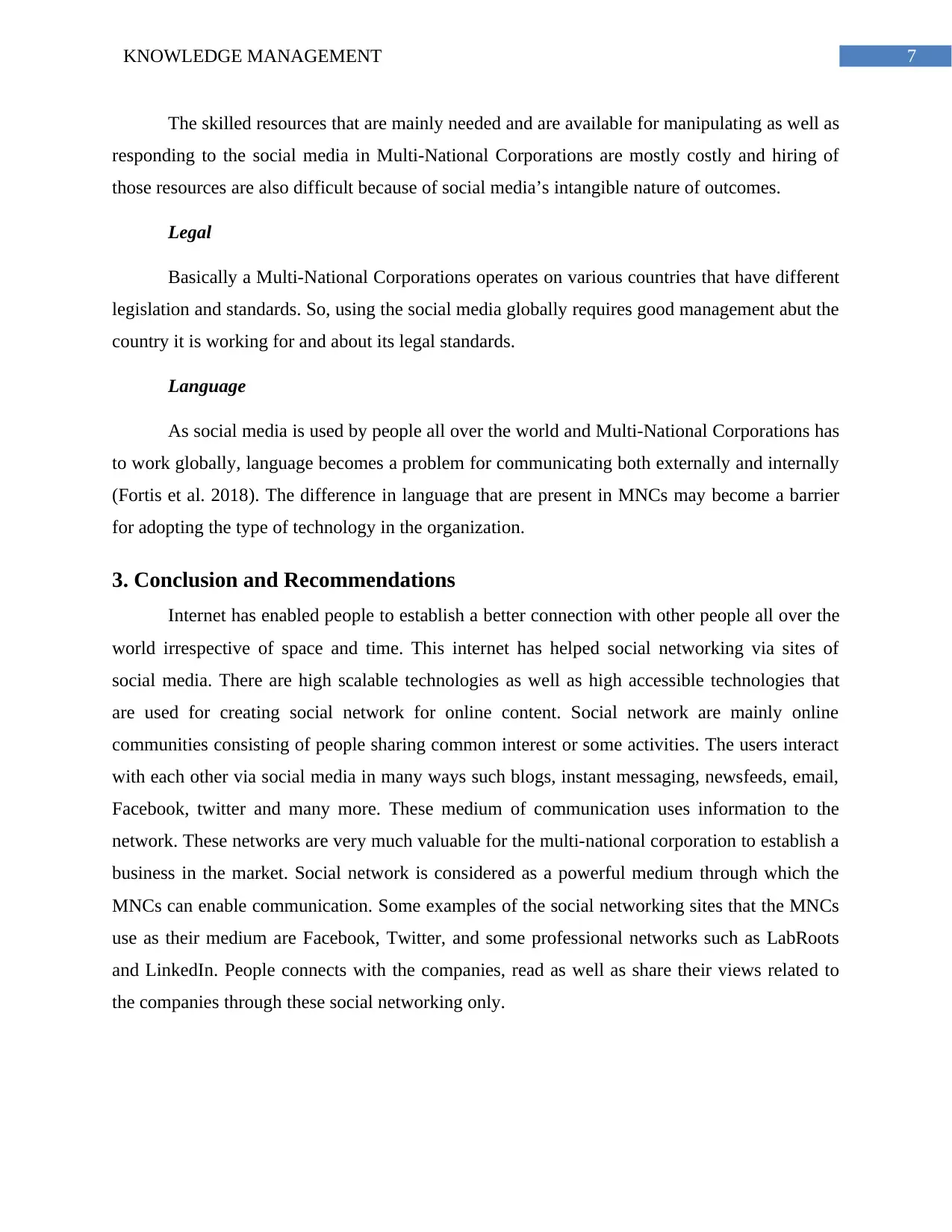
7KNOWLEDGE MANAGEMENT
The skilled resources that are mainly needed and are available for manipulating as well as
responding to the social media in Multi-National Corporations are mostly costly and hiring of
those resources are also difficult because of social media’s intangible nature of outcomes.
Legal
Basically a Multi-National Corporations operates on various countries that have different
legislation and standards. So, using the social media globally requires good management abut the
country it is working for and about its legal standards.
Language
As social media is used by people all over the world and Multi-National Corporations has
to work globally, language becomes a problem for communicating both externally and internally
(Fortis et al. 2018). The difference in language that are present in MNCs may become a barrier
for adopting the type of technology in the organization.
3. Conclusion and Recommendations
Internet has enabled people to establish a better connection with other people all over the
world irrespective of space and time. This internet has helped social networking via sites of
social media. There are high scalable technologies as well as high accessible technologies that
are used for creating social network for online content. Social network are mainly online
communities consisting of people sharing common interest or some activities. The users interact
with each other via social media in many ways such blogs, instant messaging, newsfeeds, email,
Facebook, twitter and many more. These medium of communication uses information to the
network. These networks are very much valuable for the multi-national corporation to establish a
business in the market. Social network is considered as a powerful medium through which the
MNCs can enable communication. Some examples of the social networking sites that the MNCs
use as their medium are Facebook, Twitter, and some professional networks such as LabRoots
and LinkedIn. People connects with the companies, read as well as share their views related to
the companies through these social networking only.
The skilled resources that are mainly needed and are available for manipulating as well as
responding to the social media in Multi-National Corporations are mostly costly and hiring of
those resources are also difficult because of social media’s intangible nature of outcomes.
Legal
Basically a Multi-National Corporations operates on various countries that have different
legislation and standards. So, using the social media globally requires good management abut the
country it is working for and about its legal standards.
Language
As social media is used by people all over the world and Multi-National Corporations has
to work globally, language becomes a problem for communicating both externally and internally
(Fortis et al. 2018). The difference in language that are present in MNCs may become a barrier
for adopting the type of technology in the organization.
3. Conclusion and Recommendations
Internet has enabled people to establish a better connection with other people all over the
world irrespective of space and time. This internet has helped social networking via sites of
social media. There are high scalable technologies as well as high accessible technologies that
are used for creating social network for online content. Social network are mainly online
communities consisting of people sharing common interest or some activities. The users interact
with each other via social media in many ways such blogs, instant messaging, newsfeeds, email,
Facebook, twitter and many more. These medium of communication uses information to the
network. These networks are very much valuable for the multi-national corporation to establish a
business in the market. Social network is considered as a powerful medium through which the
MNCs can enable communication. Some examples of the social networking sites that the MNCs
use as their medium are Facebook, Twitter, and some professional networks such as LabRoots
and LinkedIn. People connects with the companies, read as well as share their views related to
the companies through these social networking only.
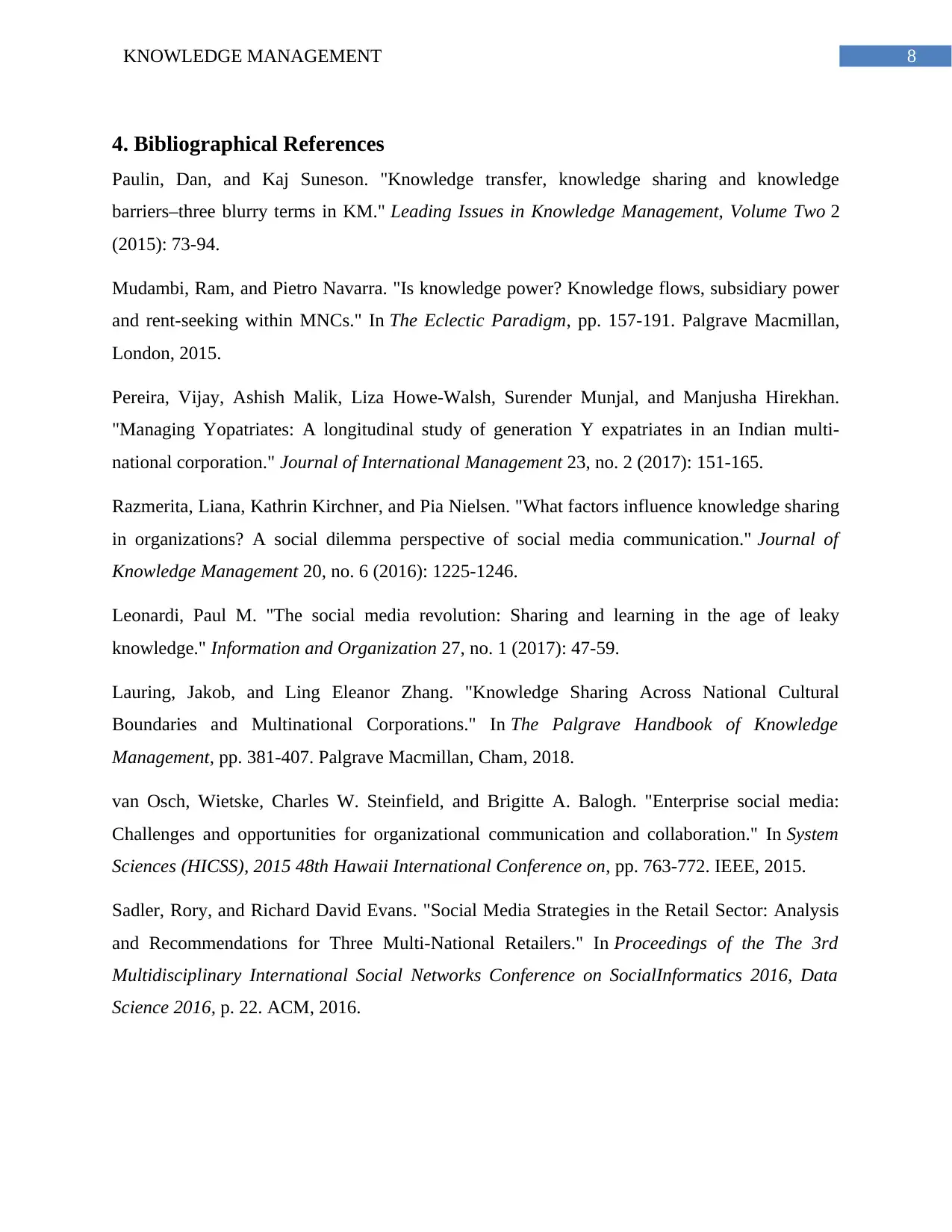
8KNOWLEDGE MANAGEMENT
4. Bibliographical References
Paulin, Dan, and Kaj Suneson. "Knowledge transfer, knowledge sharing and knowledge
barriers–three blurry terms in KM." Leading Issues in Knowledge Management, Volume Two 2
(2015): 73-94.
Mudambi, Ram, and Pietro Navarra. "Is knowledge power? Knowledge flows, subsidiary power
and rent-seeking within MNCs." In The Eclectic Paradigm, pp. 157-191. Palgrave Macmillan,
London, 2015.
Pereira, Vijay, Ashish Malik, Liza Howe-Walsh, Surender Munjal, and Manjusha Hirekhan.
"Managing Yopatriates: A longitudinal study of generation Y expatriates in an Indian multi-
national corporation." Journal of International Management 23, no. 2 (2017): 151-165.
Razmerita, Liana, Kathrin Kirchner, and Pia Nielsen. "What factors influence knowledge sharing
in organizations? A social dilemma perspective of social media communication." Journal of
Knowledge Management 20, no. 6 (2016): 1225-1246.
Leonardi, Paul M. "The social media revolution: Sharing and learning in the age of leaky
knowledge." Information and Organization 27, no. 1 (2017): 47-59.
Lauring, Jakob, and Ling Eleanor Zhang. "Knowledge Sharing Across National Cultural
Boundaries and Multinational Corporations." In The Palgrave Handbook of Knowledge
Management, pp. 381-407. Palgrave Macmillan, Cham, 2018.
van Osch, Wietske, Charles W. Steinfield, and Brigitte A. Balogh. "Enterprise social media:
Challenges and opportunities for organizational communication and collaboration." In System
Sciences (HICSS), 2015 48th Hawaii International Conference on, pp. 763-772. IEEE, 2015.
Sadler, Rory, and Richard David Evans. "Social Media Strategies in the Retail Sector: Analysis
and Recommendations for Three Multi-National Retailers." In Proceedings of the The 3rd
Multidisciplinary International Social Networks Conference on SocialInformatics 2016, Data
Science 2016, p. 22. ACM, 2016.
4. Bibliographical References
Paulin, Dan, and Kaj Suneson. "Knowledge transfer, knowledge sharing and knowledge
barriers–three blurry terms in KM." Leading Issues in Knowledge Management, Volume Two 2
(2015): 73-94.
Mudambi, Ram, and Pietro Navarra. "Is knowledge power? Knowledge flows, subsidiary power
and rent-seeking within MNCs." In The Eclectic Paradigm, pp. 157-191. Palgrave Macmillan,
London, 2015.
Pereira, Vijay, Ashish Malik, Liza Howe-Walsh, Surender Munjal, and Manjusha Hirekhan.
"Managing Yopatriates: A longitudinal study of generation Y expatriates in an Indian multi-
national corporation." Journal of International Management 23, no. 2 (2017): 151-165.
Razmerita, Liana, Kathrin Kirchner, and Pia Nielsen. "What factors influence knowledge sharing
in organizations? A social dilemma perspective of social media communication." Journal of
Knowledge Management 20, no. 6 (2016): 1225-1246.
Leonardi, Paul M. "The social media revolution: Sharing and learning in the age of leaky
knowledge." Information and Organization 27, no. 1 (2017): 47-59.
Lauring, Jakob, and Ling Eleanor Zhang. "Knowledge Sharing Across National Cultural
Boundaries and Multinational Corporations." In The Palgrave Handbook of Knowledge
Management, pp. 381-407. Palgrave Macmillan, Cham, 2018.
van Osch, Wietske, Charles W. Steinfield, and Brigitte A. Balogh. "Enterprise social media:
Challenges and opportunities for organizational communication and collaboration." In System
Sciences (HICSS), 2015 48th Hawaii International Conference on, pp. 763-772. IEEE, 2015.
Sadler, Rory, and Richard David Evans. "Social Media Strategies in the Retail Sector: Analysis
and Recommendations for Three Multi-National Retailers." In Proceedings of the The 3rd
Multidisciplinary International Social Networks Conference on SocialInformatics 2016, Data
Science 2016, p. 22. ACM, 2016.
⊘ This is a preview!⊘
Do you want full access?
Subscribe today to unlock all pages.

Trusted by 1+ million students worldwide
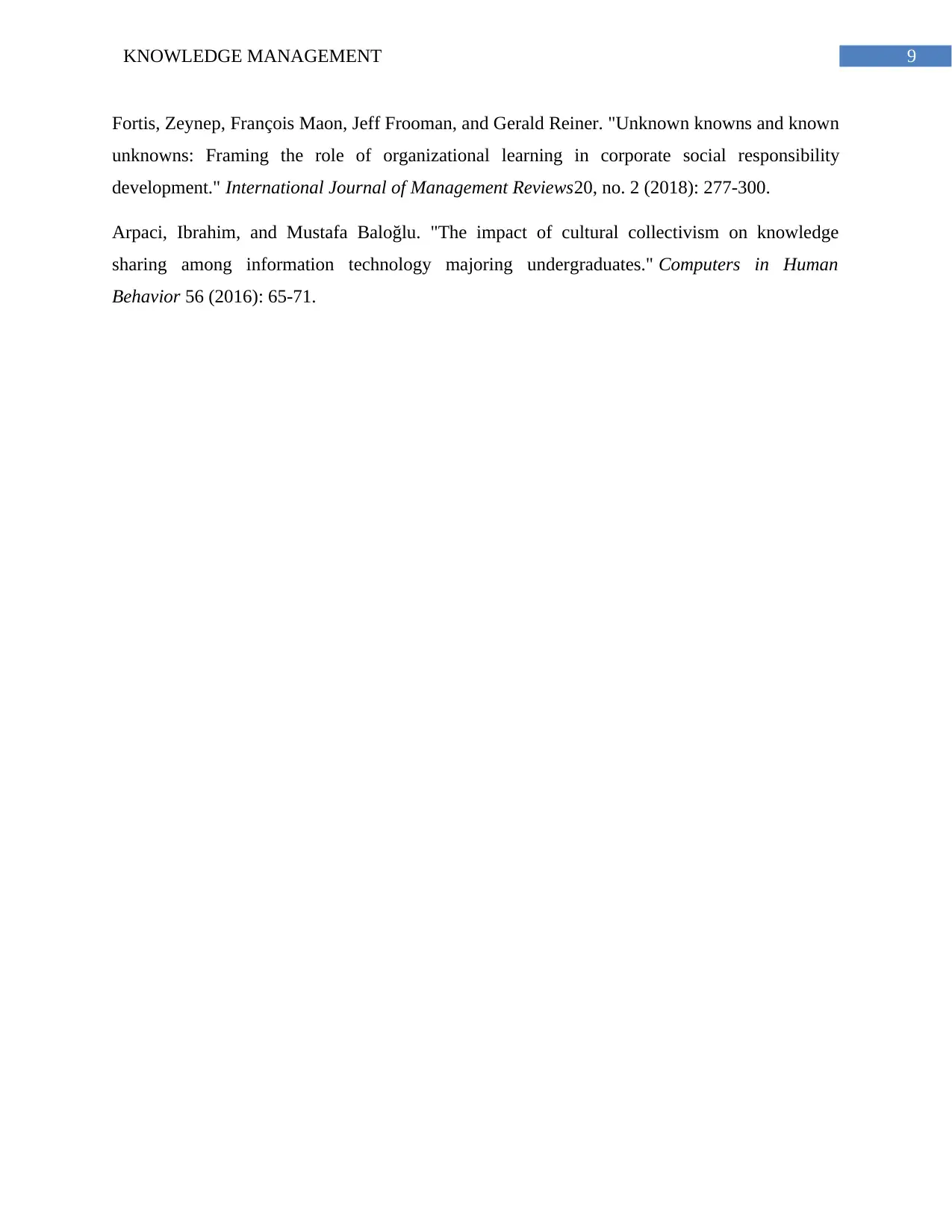
9KNOWLEDGE MANAGEMENT
Fortis, Zeynep, François Maon, Jeff Frooman, and Gerald Reiner. "Unknown knowns and known
unknowns: Framing the role of organizational learning in corporate social responsibility
development." International Journal of Management Reviews20, no. 2 (2018): 277-300.
Arpaci, Ibrahim, and Mustafa Baloğlu. "The impact of cultural collectivism on knowledge
sharing among information technology majoring undergraduates." Computers in Human
Behavior 56 (2016): 65-71.
Fortis, Zeynep, François Maon, Jeff Frooman, and Gerald Reiner. "Unknown knowns and known
unknowns: Framing the role of organizational learning in corporate social responsibility
development." International Journal of Management Reviews20, no. 2 (2018): 277-300.
Arpaci, Ibrahim, and Mustafa Baloğlu. "The impact of cultural collectivism on knowledge
sharing among information technology majoring undergraduates." Computers in Human
Behavior 56 (2016): 65-71.
1 out of 10
Related Documents
Your All-in-One AI-Powered Toolkit for Academic Success.
+13062052269
info@desklib.com
Available 24*7 on WhatsApp / Email
![[object Object]](/_next/static/media/star-bottom.7253800d.svg)
Unlock your academic potential
Copyright © 2020–2026 A2Z Services. All Rights Reserved. Developed and managed by ZUCOL.




